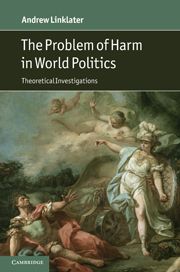Book contents
- Frontmatter
- Contents
- Preface
- Introduction
- 1 The concept of harm
- 2 The harm principle and global ethics
- 3 Harm and international relations theory
- 4 The sociology of civilizing processes
- 5 Historical sociology and world politics: structures, norms and emotions
- 6 Civilizing processes and international systems
- Conclusion
- Bibliography
- Index
Introduction
Published online by Cambridge University Press: 05 June 2012
- Frontmatter
- Contents
- Preface
- Introduction
- 1 The concept of harm
- 2 The harm principle and global ethics
- 3 Harm and international relations theory
- 4 The sociology of civilizing processes
- 5 Historical sociology and world politics: structures, norms and emotions
- 6 Civilizing processes and international systems
- Conclusion
- Bibliography
- Index
Summary
Zealous devotees of the Buddhist doctrine of ahimsa (or non-harming) are reported to wear masks and strain drinking water lest they kill insects unintentionally (Amore 1996: 244). Jain monks are alleged to carry small brushes to clear the path ahead of them so they avoid killing unseen insects; they are said to refrain from lighting fires or lamps in case insects are drawn towards them and destroyed (Bowker 1975: 281–2). Even though they may seem excessively burdensome to those brought up in Western ways of life, and may also attract ridicule, such precautions merit respect as codes of conduct that display powerful commitments to avoiding unnecessary harm in daily life. Laudable though the devotion to avoiding unnecessary suffering may be as a personal ideal, the realist will stress that adherents enjoy the moral luxury that comes with freedom from the responsibilities that are linked with the public duty to ensure the security and survival of the state. In the international political domain, circumstances frequently arise where compromising far less exacting moral codes than that enshrined in the notion of ahimsa is inescapable. Those who believe that ‘brute force has hitherto governed the world’ (Wollstonecraft 1992 [1792]: 40), and will forever do so, may add that the ideal of avoiding harm is not just politically irresponsible but destined to permanent ruination at the hands of the unforgiving logic of international anarchy.
Information
- Type
- Chapter
- Information
- The Problem of Harm in World PoliticsTheoretical Investigations, pp. 1 - 28Publisher: Cambridge University PressPrint publication year: 2011
Accessibility standard: Unknown
Why this information is here
This section outlines the accessibility features of this content - including support for screen readers, full keyboard navigation and high-contrast display options. This may not be relevant for you.Accessibility Information
- 1
- Cited by
